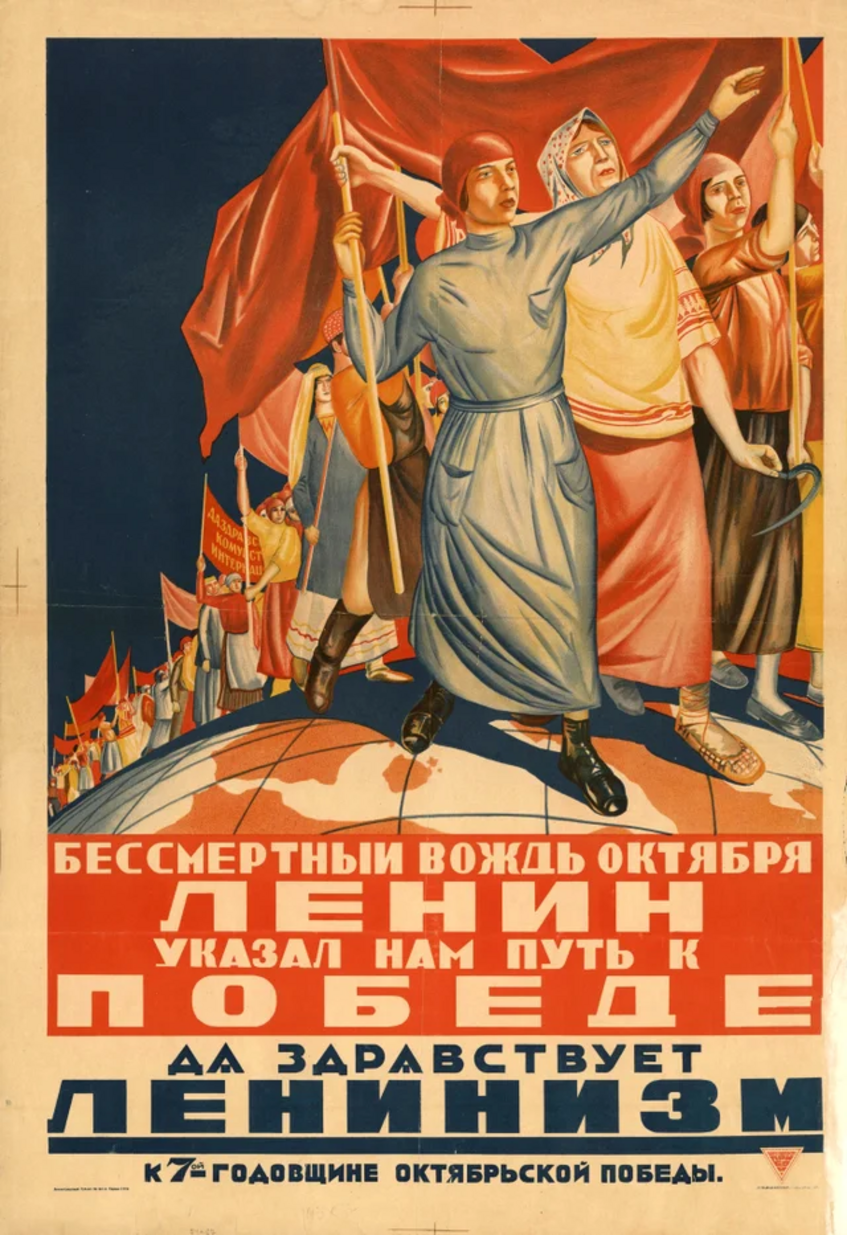Russia, America, race, gender and progress

The immortal leader of October, Lenin, showed us the way to victory. Long live Leninism". Soviet feminist poster, 1924; Public Domain.
Russia, America, race, gender and progress
Katharina Wiedlack analyses the impact of Russian thought and people on American progressives, suffragists, abolitionists, and social reformers during the 19th and early 20th century.
The research project Rivals of the Past, Children of the Future: Localizing Russia within US National Identity Formation from a Historical Perspective, which is funded by the Austrian Science Fund (FWF), Katharina Wiedlack analyses the significance of Russia, Russian thought and people for US identity formation and the negotiation of what we know today as ‘Western values’ from a historical perspective. By examining early American imaginaries of Russia it will shed light on the full range of at times incongruent American ideas about Russian bodies within American popular culture from a cross-sectional historical perspective. It will thereby be possible to obtain a better understanding of the two currently existing and each other contradicting views on Russia: as a backward, authoritarian power that threatens vulnerable bodies and, as territory that produces artistic sophistication and intellectual innovation.
One of the cultural terrains that Wiedlack analyses to get an idea about the impact of Russia and Russians on U.S. thought is U.S. feminism. Looking at the roots of Russian socialist and communist thought within U.S. feminism, especially its radical iterations that fundamentally challenge conservative and neoliberal institutions, it is possible to understand Black feminism, decolonial feminism, but also queer feminism not as a progressive force that emerged and thrived in the West, before it was exported to safe ‘the Rest’ of the world, but as a multiplicity of imports. While this import should not be reduced to any sphere, and while the immense knowledge transfer from the so-called “global South” to U.S. feminism must not be obliviated or ignored, the project wants to focus specifically on the historic influence of feminist thought from the “global East”.
Suffragists, abolitionists, and early women’s rights advocates such as Elizabeth Cady Stanton, Alice Stone Blackwell, Lillian Wald, or Jane Addams were highly engaged with Russian revolutionary thinking and activists. While their impact on U.S. society is hardly denied, their active engagement with Russian revolutionary discourses is rather unknown or ignored. Single women* who immigrated to the U.S. from the Russian empire are seen as significant for contemporary queer feminist theory, most importantly Emma Goldman. Yet, though her significance is acknowledged, her case is mostly presented as singular and the engagement with Russian discourses that brought about her revolutionary thinking is not seen as significantly contributing to her ideas. This tendency of mitigating the impact of Russian discourses of progress and modernization on U.S. thought is furthered in the gaze on Black feminism and radical Black thought in general. The intense engagement with Russia by Black scientists such as W. E. B. Du Bois for example is seldom emphasized, and the while his influence on Black feminists such as Louise Thompson Patterson or Shirley Graham Du Bois is acknowledged, their engagement with Russia, which significantly contributed to the formation of their feminist consciousness and feminist theorization of the U.S. condition is not.
Due to a lack of attention to the influence of global East to the U.S. history of feminist and queer epistemology, past and contemporary socialist or Marxist (aspects of) feminism and queer movements were obliviated. The anti-Marxist tendencies of feminist history writing did not only silence communist ideas in movements such as the suffragist movement and help to forget Black feminists contributions to the radical Left. It also helped to ignore those aspects of popular feminist through that did not align with neoliberal capitalism, such as the Combahee River Collectives’ emphasize on the class struggle from a socialist perspective, or Lorde’s communist activism etc. A brief look into the Marxist or Soviet roots of the suffragette movement, as well as radical Black feminism research might, however, allow for a strengthening of these developments within feminist and queer studies that systematically interrogate the systemic and materialist histories of U.S. (neo)colonialism, capitalism and heteropatriarchy.
- Homepage - katharinawiedlack.com
- Rivals of the Past, Children of the Future - Project page
- Rivals of the Past, Children of the Future @ katharinawiedlack.com
- Looking Eastward @ katharinawiedlack.com
- Wiedlack, Katharina. «A feminist becoming? Louise Thompson Patterson’s and Dorothy West’s sojourn in the Soviet Union». Feminismo/s 36 (December 2020): 103-128. Monographic dossier / Dosier monográfico: Departures and Arrivals: Women, Mobility and Travel Writing / Salidas y llegadas: mujeres, movilidad y escritura de viajes, Raquel García-Cuevas García y Sara Prieto García-Cañedo (coords.), doi.org/10.14198/fem.2020.36.05
